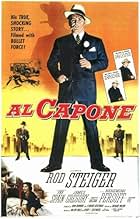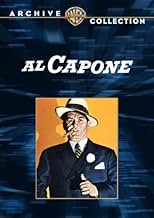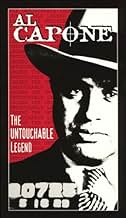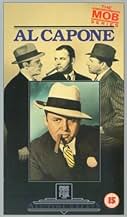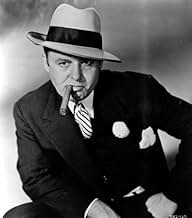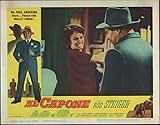IMDb RATING
6.7/10
2.1K
YOUR RATING
A chronicle of the rise and fall of Chicago crime boss Al Capone during the Prohibition era.A chronicle of the rise and fall of Chicago crime boss Al Capone during the Prohibition era.A chronicle of the rise and fall of Chicago crime boss Al Capone during the Prohibition era.
- Awards
- 1 win & 1 nomination total
Raikin Ben-Ari
- Ben Hoffman
- (as Ben Ari)
Fred Aldrich
- Funeral Spectator
- (uncredited)
Cindy Ames
- Nurse
- (uncredited)
- Director
- Writers
- All cast & crew
- Production, box office & more at IMDbPro
Featured reviews
This movie is the best presentation of "Al Capone" that I've ever seen. The movie is presented in a "Doccumentary" format which kept me "rivited" to the screen. This cast is an "All Star Cast" to say the least. Rod Steiger did an excellant job playing the character of "Al Capone" and as far as I'm concerned, has set the "standard" for other Actors to follow on how to play that particular character. I've seen the character of "Al Capone" played by Robert Di Nero, Jason Robards, Neville Brand, & Al Pacino, but NOBODY played him like Rod Steiger!!!
Also, when you have supporting cast members like Fay Spain, Martin Balsam & Neamiah Persoff, the production in my opinion can't help but be a hit. The way this Movie was put together gives it the ability to be relevant in just about any era. Even though it was filmed in 1959, it didn't show any signs of being "outdated" or "out of touch" in any way.
Once again, a great movie with some great acting in it. I would highly reccomend this movie to anyone.
Also, when you have supporting cast members like Fay Spain, Martin Balsam & Neamiah Persoff, the production in my opinion can't help but be a hit. The way this Movie was put together gives it the ability to be relevant in just about any era. Even though it was filmed in 1959, it didn't show any signs of being "outdated" or "out of touch" in any way.
Once again, a great movie with some great acting in it. I would highly reccomend this movie to anyone.
Like so many mid-century biographical films, Al Capone marches through the man's life, giving equal weight to each way-point. It also fails miserably by providing no psychological or historical context for how he became one of crime's most notorious characters. In fact, the film succeeds in white-washing this killer. He woos the widow of one of his victims. He repeatedly makes the point that he's never been convicted of any crime. People die, but there is no depiction of Capone's ruthless, brutal side. Rod Steiger in the title role does an admirable job with the shallow script, but this is not enough to make the film worth watching. Oddly, there's no mention of Elliot Ness and when it comes to summing up Capone's end, we're told he died of "an incurable disease." What, audiences in 1959 couldn't handle the word "syphilis"?
I loved this black and white movie. It stared Rod Steiger who comes across like Mr. Tony Soprano actually. It was told in the tradition of a biography. Capone was so violent yet a great businessman. This movie is borderline FILM NOIR. Mr. Capone, in the movie, starts out as a simple bouncer and them works his way up to the bossman of the Chicago Syndicate. He eventually was convicted on INCOME TAX evasion and sentenced to 11 years at THE ROCK. The movie even takes us into THE ROCK where it shows Capone and how he loses his power. What makes this movie really great is simply ROD's portrayal of Scarface. He plays it very very well. If I had to choose ANY GANGSTER movie from that subject matter, this is it.
This 1959 picture is yet another cinematic retelling of the life of mobster Al Capone, and is better than most I've seen. Rod Steiger as Big Al seems miscast at first but wins me over in the end. Steiger was a born ham, but a fine actor for all his Methodish mannerisms, and has moments in the movie in which he's almost hypnotically effective. Yes, it's a performance, I kept on telling myself, but so was Capone himself. Over the top, perhaps, but Capone was himself more than a little touched, and Steiger nails this aspect of Capone to perfection, and is more effective in capturing the big guy's capriciousness than Robinson or Muni before him. Steiger's Capone isn't merely a gangster, he's a man possessed.
Director Richard Wilson's keeps this fairly modestly budgeted film moving at a fast pace, and it's never boring. In supporting roles, Fay Spain, Martin Balasm, James Gregory and Nehemiah Persoff are all effective. The black and white of this film evokes the late fifties more than the roaring twenties, and the movie at times feels a little like an episode of The Untouchables, at other times like Some Like It Hot. The Jazz Age was itself hot as the Eisenhower era was drawing to a close. F. Scott Fitzgerald's novels were coming back into vogue. O'Neill revivals on and off-Broadway were becoming commonplace. Al Capone captures this nostalgic mood, but really makes me nostalgic for the fifties more than for the twenties, for a time when fairly recent history could still be viewed as larger than life, the stuff of serious art and contemplation, not just fashionable nostalgia. Al Capone the movie is more nostalgia than serious art, but it touches on important issues, concerning violence, friendship, the role of government and the press as they pertain to and often collude with the criminal element, that still resonate today.
Director Richard Wilson's keeps this fairly modestly budgeted film moving at a fast pace, and it's never boring. In supporting roles, Fay Spain, Martin Balasm, James Gregory and Nehemiah Persoff are all effective. The black and white of this film evokes the late fifties more than the roaring twenties, and the movie at times feels a little like an episode of The Untouchables, at other times like Some Like It Hot. The Jazz Age was itself hot as the Eisenhower era was drawing to a close. F. Scott Fitzgerald's novels were coming back into vogue. O'Neill revivals on and off-Broadway were becoming commonplace. Al Capone captures this nostalgic mood, but really makes me nostalgic for the fifties more than for the twenties, for a time when fairly recent history could still be viewed as larger than life, the stuff of serious art and contemplation, not just fashionable nostalgia. Al Capone the movie is more nostalgia than serious art, but it touches on important issues, concerning violence, friendship, the role of government and the press as they pertain to and often collude with the criminal element, that still resonate today.
Chicago in the 1920's: rife with political and police corruption and increasingly run by mobsters. The most famous of them undoubtedly was Al Capone. In this bio-pic, Capone is played very effectively by Rod Steiger. Steiger captured both the role and the man. Capone was a guy of humble origins, but was a bit of a contradiction: he had no education but a love for culture; he was a ruthless gangster but for the most part stayed legally "clean." Steiger captured both the ruthlessness and the culture with his portrayal. Based on actual photographs of Capone that I've seen, Steiger even looked the part. He was very impressive.
The movie basically traces Capone's career in crime from the time he arrives in Chicago in 1919 as a bodyguard to a local crime figure and takes it up to his conviction for income tax evasion of all things (it was the only crime they could ever actually pin on him) in 1931, with a very brief look at Capone in Alcatraz, and a voice-over explaining his last years before his death in 1947. Watching his rise was always interesting. A lot of this is fictional. James Gregory's character (the honest Chicago cop who commits himself and his entire career to bringing Capone down, and from whose perspective the story is told) didn't exist, and there's no portrayal of Capone's actual marriage; instead the movie focuses on a relationship he supposedly develops with a woman (Fay Spain) whose husband he had killed in the early part of his criminal career. The character of the newspaperman Keely (Martin Balsam) was based on a real figure, although the name was changed.
By the standards of the modern era of film-making, this is laughably clean. There are a lot of shootouts, but no blood ever appears on those who are shot and killed, and in general these gangsters are awfully polite! There's an extended look on the planning of the St. Valentine's Day Massacre (as Capone used his men to take out many of his rivals in Chicago while he stayed at his home in Florida) although the Massacre itself doesn't take very long and - again - isn't especially graphic.
This represents an interesting and believable (if not quite historically accurate) look at not only Capone but at the state of Chicago in the era and of the role that Prohibition played in promoting the rise of organized crime, and Steiger's performance alone makes this worth watching. (8/10)
The movie basically traces Capone's career in crime from the time he arrives in Chicago in 1919 as a bodyguard to a local crime figure and takes it up to his conviction for income tax evasion of all things (it was the only crime they could ever actually pin on him) in 1931, with a very brief look at Capone in Alcatraz, and a voice-over explaining his last years before his death in 1947. Watching his rise was always interesting. A lot of this is fictional. James Gregory's character (the honest Chicago cop who commits himself and his entire career to bringing Capone down, and from whose perspective the story is told) didn't exist, and there's no portrayal of Capone's actual marriage; instead the movie focuses on a relationship he supposedly develops with a woman (Fay Spain) whose husband he had killed in the early part of his criminal career. The character of the newspaperman Keely (Martin Balsam) was based on a real figure, although the name was changed.
By the standards of the modern era of film-making, this is laughably clean. There are a lot of shootouts, but no blood ever appears on those who are shot and killed, and in general these gangsters are awfully polite! There's an extended look on the planning of the St. Valentine's Day Massacre (as Capone used his men to take out many of his rivals in Chicago while he stayed at his home in Florida) although the Massacre itself doesn't take very long and - again - isn't especially graphic.
This represents an interesting and believable (if not quite historically accurate) look at not only Capone but at the state of Chicago in the era and of the role that Prohibition played in promoting the rise of organized crime, and Steiger's performance alone makes this worth watching. (8/10)
Did you know
- TriviaMartin Balsam's character, Mac Keeley, was based on a real-life Chicago Tribune reporter named Jake Lingle. Lingle, a "legman" who ran down gang-related stories for the paper, had close ties to Al Capone and other gangsters as well as the notoriously corrupt Chicago Police Department, and he was well-paid by both mobsters and a police commissioner as a "go-between." Lingle was gunned down on June 9, 1930, much as depicted in the movie, after "getting too big for his hat", as Capone put it, and demanding too much for his services (though a Capone rival likely paid for the hit). Apparently legal concerns prevented the producers of this film from using Lingle's name. However, just a few months after this film was released, the TV series The Untouchables (1959) told Lingle's story in its third episode and used his actual name.
- GoofsAl Capones had two scars on his left cheek according to actual (if rare - Capone disliked being photographed to show them as is correctly pointed out in the film) photos. The depiction in films like The St. Valentine's Day Massacre (1967) and Capone (1975) is closer to the truth.
- Quotes
Al Capone: Nobody leaves Al Capone, you understand that?
Maureen Flannery: Well I do!
Al Capone: Oh no, you don't!
Maureen Flannery: Would you do me a favor please? Would you kill me?
- ConnectionsEdited into The Mystery of Al Capone's Vaults (1986)
- How long is Al Capone?Powered by Alexa
Details
- Release date
- Country of origin
- Language
- Also known as
- The Al Capone Story
- Filming locations
- Production company
- See more company credits at IMDbPro
Box office
- Budget
- $550,000 (estimated)
- Runtime
- 1h 44m(104 min)
- Color
- Aspect ratio
- 1.85 : 1
Contribute to this page
Suggest an edit or add missing content


